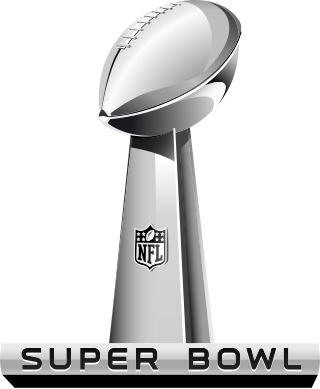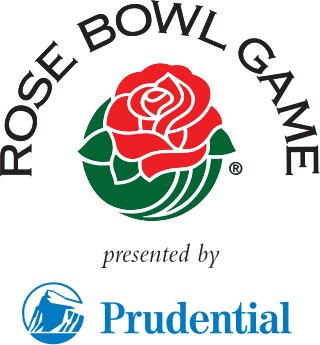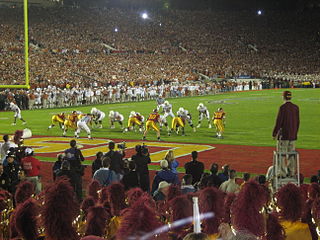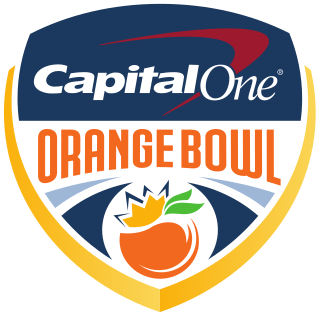Related Research Articles

College football refers to gridiron football that is played by teams of amateur student-athletes at universities and colleges. It was through collegiate competition that gridiron football first gained popularity in the United States.

The National Football League (NFL) is a professional American football league that consists of 32 teams, divided equally between the American Football Conference (AFC) and the National Football Conference (NFC). The NFL is one of the major professional sports leagues in the United States and Canada and the highest professional level of American football in the world. Each NFL season begins with a three-week preseason in August, followed by the 18-week regular season which runs from early September to early January, with each team playing 17 games and having one bye week. Following the conclusion of the regular season, seven teams from each conference advance to the playoffs, a single-elimination tournament that culminates in the Super Bowl, which is contested in February and is played between the winners of the AFC and NFC championship games.

The Super Bowl is the annual league championship game of the National Football League (NFL) of the United States. It has served as the final game of every NFL season since 1966, replacing the NFL Championship Game. Since 2022, the game is played on the second Sunday in February. Prior Super Bowls were played on Sundays in early to mid-January from 1967 to 1978, late January from 1979 to 2003, and the first Sunday of February from 2004 to 2021. Winning teams are awarded the Vince Lombardi Trophy, named after the eponymous coach who won the first two Super Bowls. Due to the NFL restricting use of its "Super Bowl" trademark, it is frequently referred to as the "big game" or other generic terms by non-sponsoring corporations. The day the game is played is often referred to as "Super Bowl Sunday" or simply "Super Sunday".

The National Football League All-Star Game (1939–1942), Pro Bowl (1951–2022), or Pro Bowl Games is an annual event held by the National Football League (NFL) featuring the league's star players.

The Rose Bowl Game is an annual American college football bowl game, usually played on January 1 at the Rose Bowl in Pasadena, California. When New Year's Day falls on a Sunday, the game is played on Monday, January 2. Nicknamed "The Granddaddy of Them All" by broadcaster Keith Jackson, it was the first postseason football game ever established. The Rose Bowl Game was first played in 1902 as the Tournament East–West football game, and has been played annually since 1916. Since 1945, it has been the highest attended college football bowl game. The game is a part of the Pasadena Tournament of Roses Association's "America's New Year Celebration", which also includes the historic Rose Parade. Winners of the game received the Leishman Trophy, named for former Tournament of Roses presidents, William L. Leishman and Lathrop K. Leishman who played an important part in the history of this game.

The Sugar Bowl is an annual American college football bowl game played in New Orleans, Louisiana. Played annually since January 1, 1935, it is tied with the Orange Bowl and Sun Bowl as the second-oldest bowl games in the country, surpassed only by the Rose Bowl Game.

Thomas Edward Patrick Brady Jr. is a former American football quarterback who played in the National Football League (NFL) for 23 seasons. He spent his first 20 seasons with the New England Patriots and was a central contributor to the franchise's dynasty from 2001 to 2019 under head coach Bill Belichick. In his final three seasons, he was a member of the Tampa Bay Buccaneers. Brady is widely regarded as the greatest quarterback of all time and one of the greatest players in NFL history.

The Bowl Championship Series (BCS) was a selection system that created four or five bowl game match-ups involving eight or ten of the top ranked teams in the NCAA Division I Football Bowl Subdivision (FBS) of American college football, including an opportunity for the top two teams to compete in the BCS National Championship Game. The system was in place for the 1998 through 2013 seasons and in 2014 was replaced by the College Football Playoff.

In North America, a bowl game, or simply bowl, is one of a number of postseason college football games that are primarily played by teams belonging to the NCAA's Division I Football Bowl Subdivision (FBS). For most of its history, the Division I Bowl Subdivision had avoided using a playoff tournament to determine an annual national champion, which was instead traditionally determined by a vote of sports writers and other non-players. In place of such a playoff, various cities across the United States developed their own regional festivals featuring postseason college football games. Prior to 2002, bowl game statistics were not included in players' career totals. Despite attempts to establish a permanent system to determine the FBS national champion on the field, various bowl games continue to be held because of the vested economic interests entrenched in them.

The Rose Bowl is an outdoor athletic stadium located in Pasadena, California. Opened in October 1922, the stadium is recognized as a National Historic Landmark and a California Historic Civil Engineering landmark. At a modern capacity of an all-seated configuration at 92,542, the Rose Bowl is the 16th-largest stadium in the world, the 11th-largest stadium in the United States, and the 10th-largest NCAA stadium. The stadium is 10 miles northeast of downtown Los Angeles.

The BCS National Championship Game, or BCS National Championship, was a postseason college football bowl game, used to determine a national champion of the NCAA Division I Football Bowl Subdivision (FBS), first played in the 1998 college football season as one of four designated bowl games, and beginning in the 2006 season as a standalone event rotated among the host sites of the aforementioned bowls.

The Michigan Wolverines football team represents the University of Michigan in college football at the NCAA Division I Football Bowl Subdivision level. Michigan has the most all-time wins in college football history. The team is known for its distinctive winged helmet, its fight song, its record-breaking attendance figures at Michigan Stadium, and its many rivalries, particularly its annual, regular season-ending game against Ohio State, known simply as "The Game," once voted as ESPN's best sports rivalry.

The Army Black Knights football team, previously known as the Army Cadets, represents the United States Military Academy in college football. Army is a Division I Football Bowl Subdivision (FBS) member of the NCAA. The Black Knights play home games in Michie Stadium with a capacity of 38,000 at West Point, New York. The Black Knights are coached by Jeff Monken, who has held the position since 2014. Army claims three national championships from 1944 to 1946. In addition, major selectors have awarded Army championships in 1914 and 1916. Army has produced 24 players and four coaches in the College Football Hall of Fame, 37 consensus All-Americans, and three Heisman Trophy winners.

The Alabama Crimson Tide football program represents the University of Alabama in the sport of American football. The team competes in the Football Bowl Subdivision (FBS) of the National Collegiate Athletic Association (NCAA) and the Western Division of the Southeastern Conference (SEC). The team's head coach is Nick Saban, who has led the Tide to six national championships over his tenure. The Crimson Tide is among the most storied and decorated football programs in NCAA history. Since beginning play in 1892, the program claims 18 national championships, including 13 wire-service national titles in the poll-era, and five other titles before the poll-era. From 1958 to 1982, the team was led by Hall of Fame coach Paul "Bear" Bryant, who won six national titles with the program. It was not until 2009 that an Alabama player received a Heisman Trophy, when running back Mark Ingram II became the university's first winner. In 2015, Derrick Henry became the university's second Heisman winner. The Crimson Tide won back to back Heisman trophies in 2020 and 2021, with DeVonta Smith and Bryce Young.
The NCAA Division I Football Bowl Subdivision (FBS), formerly known as Division I-A, is the highest level of college football in the United States. The FBS consists of the largest schools in the National Collegiate Athletic Association (NCAA). As of the 2023 season, there are 10 conferences and 133 schools in FBS.

A national championship in the highest level of college football in the United States, currently the NCAA Division I Football Bowl Subdivision (FBS), is a designation awarded annually by various organizations to their selection of the best college football team. Division I FBS football is the only National Collegiate Athletic Association (NCAA) sport for which the NCAA does not sanction a yearly championship event. As such, it is sometimes referred to as a "mythical national championship".

The Orange Bowl is an annual American college football bowl game that has been played annually in the Miami metropolitan area since January 1, 1935. Along with the Sugar Bowl and the Sun Bowl, it is one of the oldest bowl games in the country behind only the Rose Bowl, which was first played in 1902 and has been played annually since 1916. The Orange Bowl was originally held in the city of Miami at Miami Field before moving to the Miami Orange Bowl stadium in 1938. In 1996, it moved to its current location at Hard Rock Stadium in Miami Gardens, the home football field for both the University of Miami and Miami Dolphins. Since December 2014, the game has been sponsored by Capital One and officially known as the Capital One Orange Bowl. Previous sponsors include Discover Financial and Federal Express/FedEx (1989–2010).

The College Football Playoff (CFP) is an annual postseason knockout invitational tournament to determine a national champion for the National Collegiate Athletic Association (NCAA) Division I Football Bowl Subdivision (FBS), the highest level of college football competition in the United States. Four teams play in two semifinal games, and the winner of each semifinal advances to the College Football Playoff National Championship game.

The New Year's Six, sometimes abbreviated as NY6, are the following NCAA Division I Football Bowl Subdivision (FBS) bowl games: the Rose Bowl, Orange Bowl, Sugar Bowl, Cotton Bowl, Peach Bowl, and Fiesta Bowl. These games are played annually on or around New Year's Day and represent six of the ten oldest bowl games played at the FBS level.